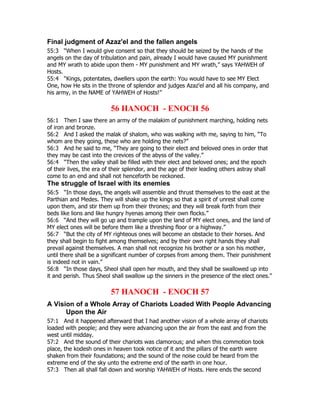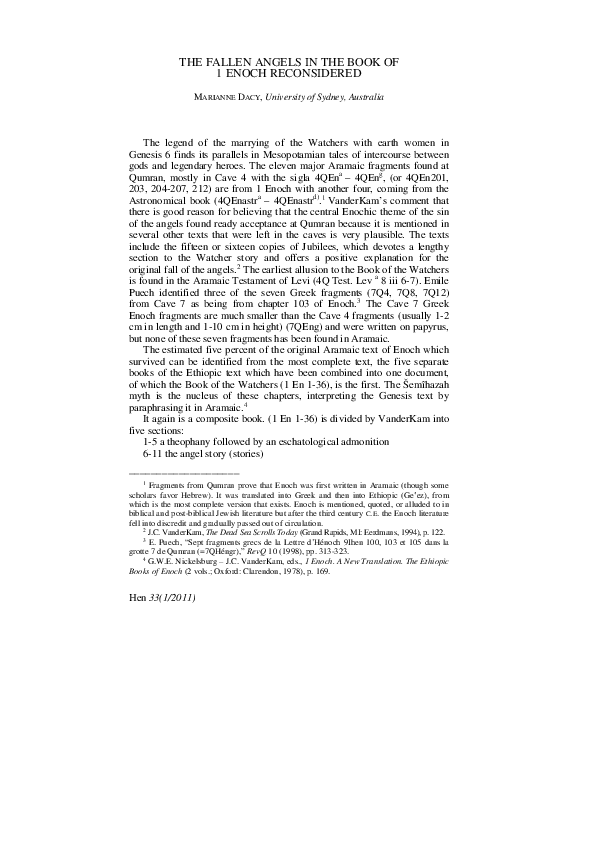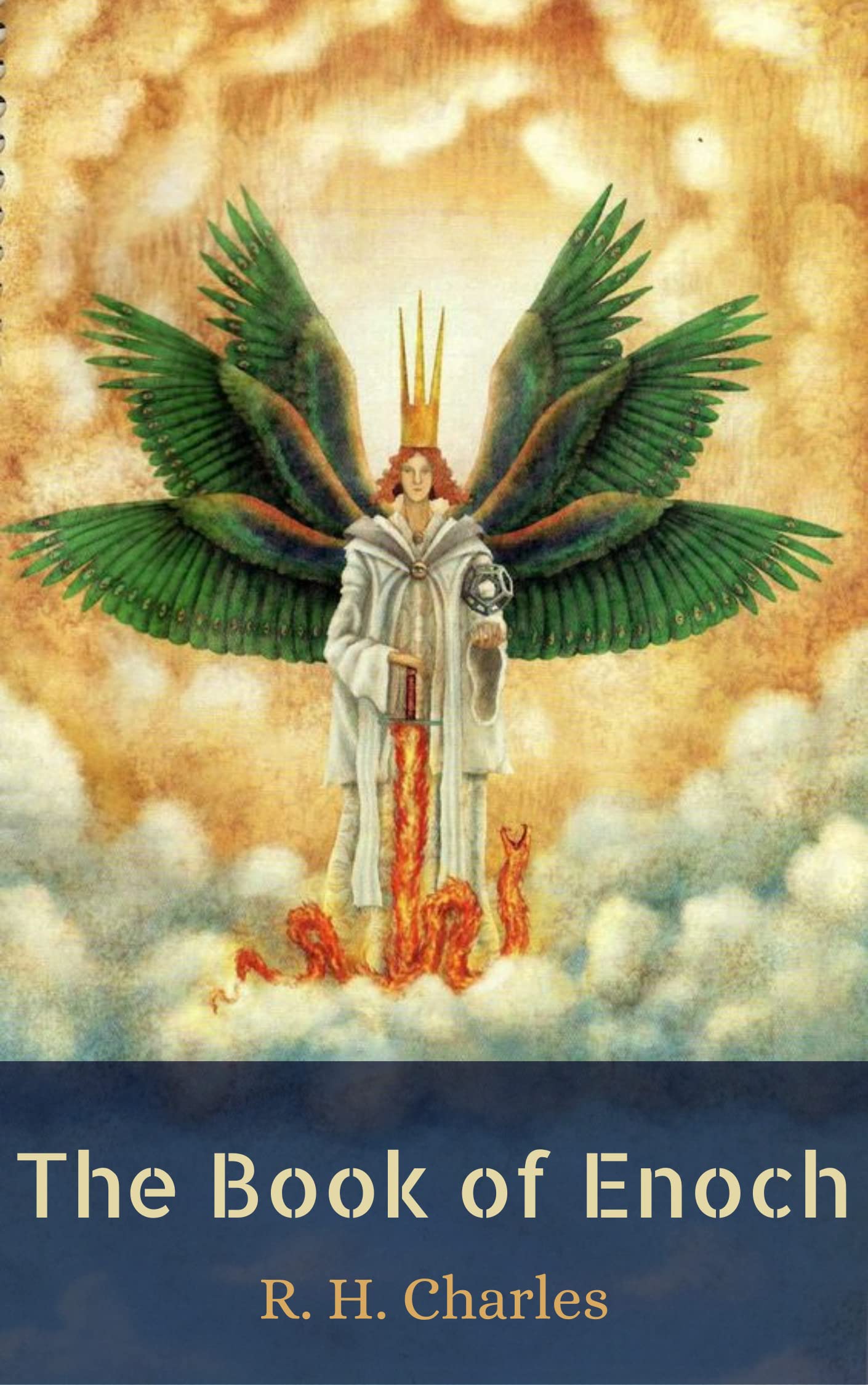The book of enoch, a pivotal text in Jewish and Christian apocrypha, stands as a testament to the rich tapestry of ancient religious beliefs and their enduring impact on later theological developments. Within its enigmatic verses lies a tale of rebellion, divine judgment, and the enduring influence of fallen angels on human history. One of the most captivating and debated elements of the book is the story of the 200 fallen angels, a narrative that has captivated theologians, scholars, and the general public for centuries.
While the Book of Enoch is not part of the canonical Bible, its influence on Christian thought and literature is undeniable. Its themes of celestial hierarchies, the fall of angels, and the relationship between humanity and the divine resonate deeply with the Judeo-Christian worldview. The story of the 200 fallen angels, in particular, has become a staple of Christian mythology and provides a framework for understanding the origins of evil, the nature of temptation, and the ongoing struggle between good and evil.
In this article, we will take a closer look at the story of the 200 fallen angels in the Book of Enoch. We will explore the events leading up to their fall, the consequences of their actions, and the role of the prophet Enoch in revealing divine judgment. We will also examine the influence of this narrative on Christian and Jewish traditions and the debates surrounding it in modern scholarship.
The Sin of the Watchers and Their Descent to Earth

The story of the 200 fallen angels is found in chapters 6-16 of the Book of Enoch. These celestial beings, known as the Watchers, were created by God to watch over and guide humanity. However, their downfall begins when they are seduced by the beauty of human women and succumb to their lustful desires. This sinful act goes against their divine duty and leads to their eventual punishment.
The Forbidden Knowledge
According to the Book of Enoch, the fallen angels are not only tempted by the beauty of human women, but also by their desire for knowledge. They teach humans forbidden secrets such as astrology, metallurgy, and cosmetics, which are considered to be gifts from God that should only be used for His purposes. This act of sharing divine knowledge with humanity is seen as a violation of the natural order and a direct challenge to God’s authority.
The Descent to Earth
As a result of their sinful acts, the 200 fallen angels descend to Earth, leaving their heavenly abode. This descent is significant because it not only marks their physical separation from God, but also their spiritual separation. The fallen angels are now cut off from the divine realm and must face the consequences of their actions on Earth.
The Consequences of the Fallen Angels’ Actions: Corruption and Violence

The presence of the fallen angels on Earth has catastrophic consequences for both them and humanity. Their interactions with humans lead to the corruption and destruction of society as they teach people how to make weapons of war, engage in violence, and practice magic. The Book of Enoch describes a world filled with chaos, bloodshed, and immorality as a result of the fallen angels’ influence.
The Birth of the Nephilim
One of the most controversial elements of the story of the 200 fallen angels is the birth of the Nephilim, the offspring of the union between the fallen angels and human women. These beings are described as giants who possess great strength and are known for being violent and destructive. The presence of the Nephilim on Earth is seen as a clear sign of the fallen angels’ corruptive influence and their attempt to interbreed with humans.
The Punishment of the Fallen Angels
God’s response to the actions of the fallen angels is swift and severe. He sends a powerful archangel, Uriel, to warn Noah of the impending flood that will destroy all of humanity except for those aboard his ark. The fallen angels, on the other hand, are punished in various ways. Some are bound in chains and imprisoned in darkness until the day of judgment, while others are forced to roam the Earth as evil spirits.
The Role of Enoch and the Revelation of Divine Judgment

Amidst the chaos caused by the fallen angels, Enoch emerges as a key figure in the Book of Enoch. He is described as a righteous man who walks with God and is given the gift of prophecy. Enoch is instructed by God to reveal the fate of the fallen angels and their offspring, as well as the eventual destruction of the world by fire.
The Vision of the Heavenly Tribunal
In a vision, Enoch is taken to the heavenly tribunal where he witnesses the fallen angels being judged and condemned by God. This scene serves as a warning to the readers of the Book of Enoch, emphasizing the consequences of disobedience and rebellion against God’s will.
The Prophecy of the Flood
Enoch is also given the task of warning humanity about the impending flood, which will serve as divine punishment for the sins of the fallen angels and the corruption of humankind. This prophecy echoes the biblical account of the flood in the Book of Genesis and serves as a reminder of the consequences of straying from the path of righteousness.
The Book of Enoch’s Influence on Christian and Jewish Traditions

Although the Book of Enoch was not included in the biblical canon, its themes and ideas have had a lasting impact on both Christian and Jewish traditions. Its depiction of the fall of angels, the introduction of forbidden knowledge, and the corruption of humanity became an integral part of religious thought and influenced later works of literature.
Influence on Christian Literature
The story of the fallen angels in the Book of Enoch serves as a precursor to the biblical account of Satan’s rebellion and expulsion from heaven. This narrative has been widely used in Christian literature, such as John Milton’s “Paradise Lost” and Dante Alighieri’s “Inferno,” which depict the fall of Lucifer and his demons.
Influence on Jewish Mysticism
In Jewish mysticism, the fallen angels are seen as powerful beings who possess secret knowledge that can be harnessed for good or evil. The concept of “fallen” angels is also present in Kabbalistic literature, where they are viewed as forces of chaos and destruction that must be overcome through spiritual ascension.
Interpretations and Debates Surrounding the Fallen Angels in Modern Scholarship

The story of the 200 fallen angels has sparked numerous interpretations and debates among scholars and theologians. Some view it as a literal account of a historical event, while others see it as a metaphor for the corruption of humanity and the consequences of disobeying God’s will.
Literal vs. Metaphorical Interpretations
Some scholars argue that the story of the fallen angels is a reflection of ancient mythologies and should not be taken literally. They point to similarities with other ancient texts, such as the Mesopotamian tale of the Apkallu, which also features divine beings who descend to Earth and teach humans forbidden knowledge. Others, however, believe that the story is based on actual events and should be viewed as a warning against disobedience towards God.
Debates about the Origin of Evil
Another area of debate surrounding the fallen angels in the Book of Enoch is the origin of evil. Some scholars argue that the story presents a dualistic worldview, where evil is seen as an inherent force that exists alongside good. Others view the fall of the angels as a symbol of humanity’s potential for evil and the need for redemption.
Conclusion
The story of the 200 fallen angels in the Book of Enoch serves as a cautionary tale about the consequences of rebellion and disobedience towards God. It paints a vivid picture of a world plagued by corruption, violence, and the struggle between good and evil. The influence of this story on Christian and Jewish traditions is undeniable, and its themes continue to resonate with readers and scholars alike. Whether viewed as a literal account or a metaphorical warning, the story of the fallen angels in the Book of Enoch remains an enduring element of religious mythology and a testament to the enduring power of ancient beliefs.
